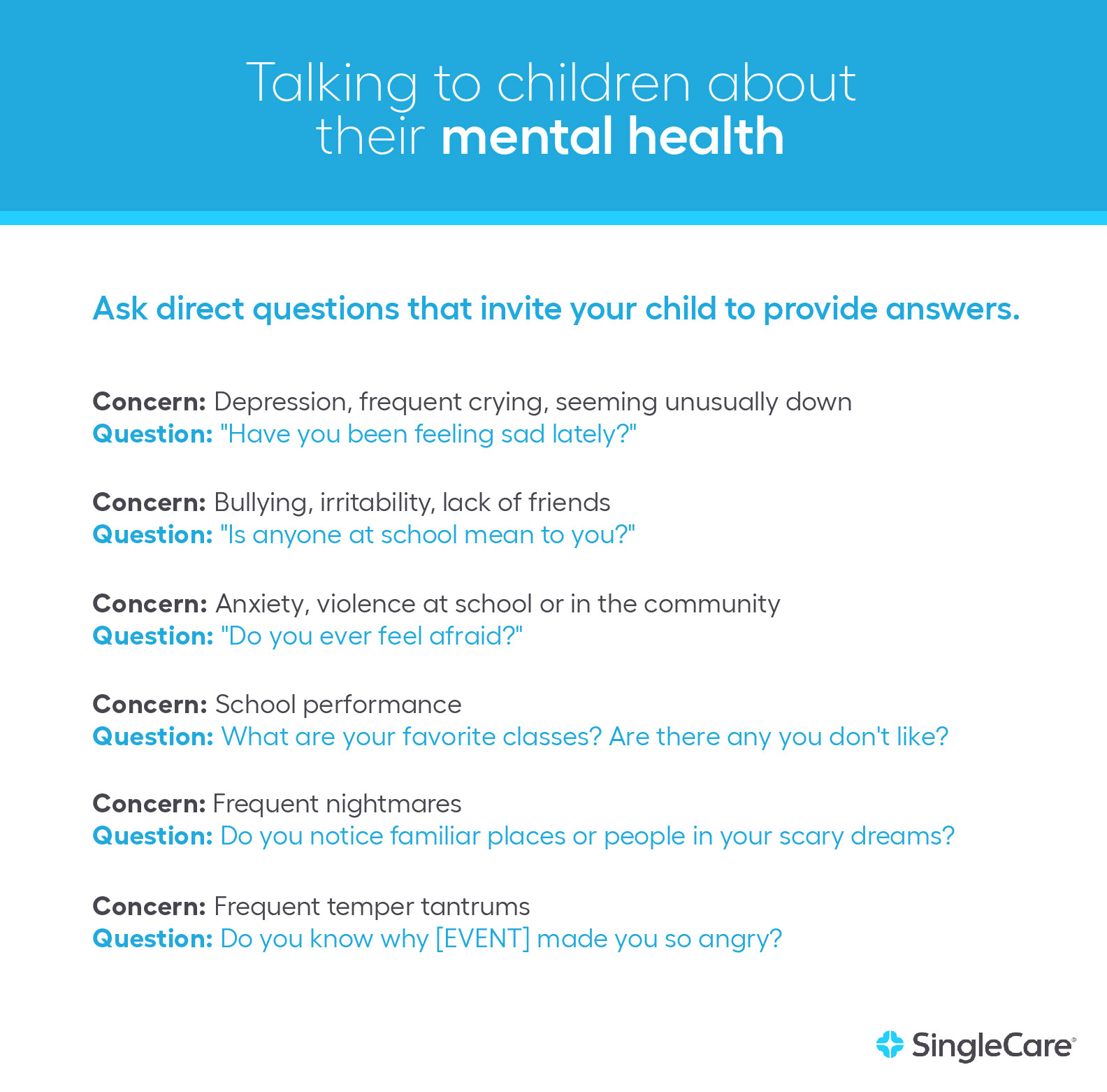Key takeaways
Good mental health in children leads to better performance in school, stronger relationships, and the development into high-functioning adults.
Children can suffer from a variety of mental illnesses, categorized into internalizing disorders, like anxiety and depression, and externalizing disorders, like ADHD and oppositional defiant disorder.
Risk factors for mental health issues in children include individual traits (like low self-esteem), family dynamics (such as parental depression), and environmental stressors (like poverty or community violence).
Improving a child’s mental health involves a healthy lifestyle, open conversations about emotions and feelings, and being attentive to warning signs of mental distress.
As a parent, there are many things you need to help your kids with—and helping children learn to talk about their feelings and emotions is one of them.
Why is my child’s mental health important?
Your child’s mental health is important because good mental health will help your child perform better in school, develop strong relationships, and grow into high-functioning adults. The skills children learn to manage their feelings as kids and teenagers will carry with them through their entire life.
What are some examples of mental illness in children?
Examples of mental illness in children include anxiety, depression, oppositional defiant disorder (ODD), obsessive-compulsive disorder (OCD), post-traumatic stress disorder (PTSD), attention-deficit/hyperactivity disorder (ADHD), and autism spectrum disorder (ASD).
It can be helpful to think of mental disorders in two categories: internalizing disorders and externalizing disorders.
Internalizing disorders primarily concern thoughts and feelings. Children experiencing internalizing disorders, like anxiety or depression, do not always show obvious symptoms that they are in trouble.
Externalizing disorders express themselves in specific behaviors. For example, children diagnosed with oppositional defiant disorder will become angry, refuse to listen to adult instructions, or act out toward others more often than other children their age. ADHD is another example of a disorder with clear, externalized symptoms.

RELATED: Cyberbullying statistics 2024
What causes mental health issues in children?
Among children ages 6 to 17, approximately 1 in 6 will experience at least one mental health disorder. There is no way to predict whether a child will experience mental illness, and no magic formula for preventing it. But experts agree that children who experience certain situations or events are more likely to develop mental problems. These situations or events are called risk factors.
RELATED: Mental health statistics
Individual risk factors
These risk factors are normal parts of adolescence but when combined with additional risk factors (or when extreme) may lead to mental disorders.
Examples of individual risk factors include:
- Low self-esteem
- Anxiety
- Poor concentration
- Poor social skills
- Insecure attachment
- Early puberty
Family risk factors
Family risk factors generally relate to the mental and emotional health of a child’s parents.
Examples of family risk factors include:
- Parental depression
- Parent-child conflict
- Poor parenting
- Negative family environment (may include substance abuse in parents)
- Child abuse/maltreatment
If any of these risk factors apply to you or your caregiving partner, help is available. These services offering immediate help are recommended by the U.S. Department of Health and Human Services.
School, neighborhood, and community risk factors
Events and situations outside of the home can trigger mental illness. Again, these factors aren’t uncommon and can be simply a part of growing up, but in some children, they are among the causes of mental health challenges.
Examples of social, neighborhood, and community risk factors include:
- Peer rejection
- Poor academic achievement
- Poverty
- Violence or stressful events in the community
- Violence or stressful events at school
If you are concerned about your child’s learning environment, speak to their teacher, counselor, or a school administrator.
When should I worry about my child’s mental health?
Children’s mental health is as important as their physical health. Stay vigilant about both.
If your children are having mood swings, or changes in behavior that last more than a few weeks and that affect their ability to function, talk to your children’s healthcare provider.
How do I know if my child has mental health issues?
Common warning signs of mental health issues in children include:
- Changes in school performance
- Excessive worry or anxiety, for instance fighting to avoid bed or school
- Hyperactive behavior
- Frequent nightmares
- Frequent disobedience or aggression
- Frequent temper tantrums
- Self-harm
- Outbursts or extreme irritability
- Weight loss or gain
- Frequent stomach aches or headaches
None of these issues are necessarily related to mental illness, so before you jump to any conclusion, have your child see a health professional.
How can I improve my child’s mental health?
Experts say that an important element of positive mental health is a healthy lifestyle. That includes:
- Eating healthy, including plenty of fruits, vegetables, and lean proteins
- Getting exercise—at least 60 minutes a day
- Getting enough sleep—at least nine hours for kids 6 to 12, and at least eight hours for kids 13 and older
- Practicing meditation, mindfulness, or relaxation techniques
Talking to your children about their mental health is important, too.
RELATED: The link between physical and mental health
How should I talk to my child about their mental health?
Like anything you do in life, talking about your feelings and emotions gets easier with practice. Don’t think of “talking about mental health” as an emergency measure. Make it part of your daily routine.
This effort starts with you. Be open about your own feelings with your children. If you are feeling sad or angry, explain to your child what’s making you feel the way you do. This way, children see that it’s okay to share negative emotions. If you hold all your feelings inside, your child will do the same. That’s not healthy for either of you.
Every day, ask at least one question about your children’s feelings, emotions, relationships, and other factors that play a role in their mental health. Don’t force them to tell you, just give them the chance to share. And pay attention to sudden changes in what they say, or how much they say. Drastic changes could be a warning sign that something is wrong.
Talking points for mental health issues
Ask direct questions that invite your child to provide answers.
Concern: Depression, frequent crying, seeming unusually down
Question: “Have you been feeling sad lately?”
Concern: Bullying, irritability, lack of friends
Question: “Is anyone at school mean to you?”
Concern: Anxiety, violence at school or in the community
Question: “Do you ever feel afraid?”
Concern: School performance
Question: “What are your favorite classes? Are there any you don’t like?”
Concern: Frequent nightmares
Question: “Do you notice familiar places or people in your scary dreams?”
Concern: Frequent temper tantrums
Question: “Do you know why [EVENT] made you so angry?”
Here are some additional tips for talking to your children about mental health, especially if you have specific concerns.
Be age appropriate
You can help children open up about their emotions by explaining and giving them communication tools that are right for them.
Preschool children are more likely to focus on what they can see. If they see you or a stranger getting angry, they’ll notice and may want to understand why. Similarly, showing an emoji or drawing may give them a way to share with you how they are feeling—rather than making them try to think up the correct word.
School-age children are trying to understand the world around them, and they ask a lot of questions. It is also common for school-age children to have fears about the safety of family and friends. Don’t dismiss their questions or concerns. Treat them seriously.
Teenagers are independent, and are more likely to seek out information on the Internet or from conversation with their friends, than to ask their parents. This is natural, but with something as important as mental health, there’s danger if they get the wrong information. It’s critical that you keep tabs on their feelings and emotions, so you can get them the right information at the right time.
Be honest about your own mental health
Whether or not you have a diagnosed mental illness, everyone deals with feelings of anxiety, sadness, and confusion.
What you do to combat those feelings—whether it’s taking prescribed medication, jogging every morning, or doing 15 minutes of meditation at bedtime—are actions your child surely knows about. Share the importance of maintaining mental health with your children, the same way you share the importance of brushing their teeth every day.
Make sure your child feels safe and comfortable
If you are sensing warning signs from your children, or feel that you need to have a deeper conversation, make sure you have them at ease. Don’t surprise them or spring the conversation on them at an unexpected time (which will be easier if you have made a point to talk about mental health every day, not only when problems arise).
If your children react badly to what you have to say, then it’s time to back up the conversation rather than pushing them and making them feel uncomfortable. Explain why you are asking these questions, and why it’s important to talk.
Listen; don’t diagnose or treat
At first, listen. Avoid the urge to label what your children are feeling, or to advance an opinion about what they should do. This could make them less likely to share in the future. And try not to react too strongly to what they say.
The most important thing you can do is get a full understanding of how your child is feeling. Then determine what the best next steps are, perhaps in consultation with your child’s healthcare provider.
If you feel your child needs to talk to a professional right away, or may need to in the future, give them information about the suicide/mental health Lifeline, a 24-hour service that can be reached by calling 1-800-273-TALK (8255).
Creating a circle of mental health
Given that suicide is the second-leading cause of death for children, adolescents, and young adults, it’s normal for a parent to worry about their child’s mental health. In fact, anxiety about your child’s mental health could end up affecting your mental health. Opening up with your child, and giving them a space to share their feelings every day, will ultimately be good for both of you. And it doesn’t have to stop when they turn 18; you can help support each other for the rest of your lives.




